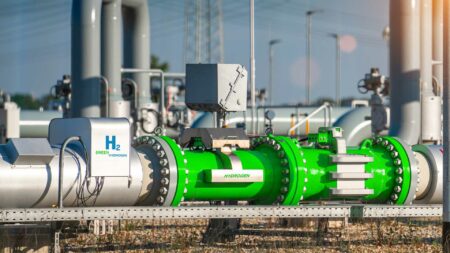According to study, adding hydrogen to the gas heating systems in the UK might result in an increase in costs of approximately £200 for the typical home.
One of the main proposals made by Jane Toogood, the government’s champion for hydrogen, in a report to ministers on how to manufacture and utilise hydrogen in the UK is the mixing of natural gas with roughly 20% hydrogen for use in residential heating systems.
However, a number of green activists, think tanks, and energy firms have written to the energy secretary, Grant Shapps, pleading with him to change his mind. According to research by the think tank E3G, hydrogen blending might result in an annual increase in heating costs of roughly £192 for the typical family.
The organisations caution that adding hydrogen to the gas supply would force users to use more gas because, when utilised in this way, hydrogen offers less energy than fossil gas.
In order to move forward with plans to incorporate hydrogen into the UK’s natural gas networks, which may happen as early as 2025, the government is anticipated to make a decision this year. Government are also thinking about adding a fee to bills to pay for the development of hydrogen.
The government is urged to “make the strategic choice to support blending of hydrogen into the gas network in 2023 and confirm a’minded to’ attitude on suitable commercial arrangements to facilitate blending,” according to the hydrogen champion report.
In order to help the UK achieve its aim of having net zero greenhouse gas emissions by 2050, hydrogen is being hailed as a potentially green fuel. However, activists are worried about two things: first, that hydrogen should be created using renewable energy rather than as a waste product from the processing of fossil fuels; and second, that some of the uses being proposed for hydrogen are inappropriate.
Because some gas experts contend it might be utilised in existing boilers without the need for new infrastructure, the government is still taking into consideration hydrogen for use in home heating. Yet, a growing body of research indicates that heat pumps and other alternatives might be more cost-effective than hydrogen for heating.
Concerns concerning “hydrogen-ready boilers” are also expressed in the letter. They are virtually the same as current gas boilers, and the government, as well as installers and suppliers, are drawn to them since they don’t require significant modifications to the UK’s current gas heating infrastructure.
However, because hydrogen produces less heat than natural gas and because there are likely to be few sources of green hydrogen, experts doubt that hydrogen-ready boilers will ever be used for home heating. Heat pumps are a better option, and using hydrogen for industrial processes where there are few or no green alternatives makes more sense.
Together with the E3G thinktank, more than 20 organisations, including Octopus Energy and the Kensa Group, a provider of heat pumps, Friends of the Earth, Fuel Poverty Action, and the UK Green Building Council, have signed the letter to Shapps.








